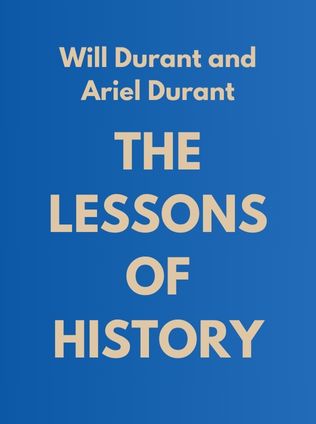
The Lessons of History
By Will Durant and Ariel Durant
Published 01/1968
About the Author
Will Durant, along with his wife Ariel Durant, has left an indelible mark on the field of historical writing. The Durants, known for their monumental work "The Story of Civilization," sought to make history accessible to all, blending scholarly research with philosophical insights. Will Durant, an educator, historian, and philosopher, dedicated his life to exploring the deeper questions of human existence, while Ariel Durant contributed her own unique perspectives, creating a balanced and insightful narrative that goes beyond mere historical events to explore the forces that drive human progress and conflict.
Main Idea
The central thesis of "The Lessons of History" by Will and Ariel Durant is that history, despite its vastness, follows certain recurring patterns governed by fundamental laws. The Durants argue that understanding these patterns can help humanity navigate the future more effectively. They explore how forces such as biology, economics, culture, and government have consistently shaped civilizations, emphasizing the enduring nature of human behavior. This book serves as a reflection on the cyclical nature of history and the lessons that can be learned by understanding its rhythms.
Table of Contents
- The Lessons of History
- History and the Earth
- Biology and History
- Race and History
- Character and History
- Morals and History
- Religion and History
- Economics and History
- Socialism and History
- Government and History
- History and War
- Growth and Decay
- Is Progress Real?
The Lessons of History
The Durants introduce history as more than just a series of events; it is a source of wisdom. They argue that history is shaped by the same forces that govern all life: survival, competition, and adaptation. By understanding these forces, we can better prepare for future challenges. The Durants emphasize that history offers valuable lessons, stating,
"The laws of biology are the fundamental lessons of history - humans are subject to the trials of selection and the struggle for existence, like all other animals." - Will Durant
Through this lens, history becomes a tool for understanding the complexities of human nature and society, offering insights into the patterns that drive human progress and conflict.
History and the Earth
Geography and climate play pivotal roles in shaping civilizations. The Durants discuss how natural environments provide both opportunities and constraints that influence the development of societies. For example, fertile lands enabled the rise of early agricultural societies, while harsh climates spurred migration and conflict. Understanding the relationship between geography and history allows us to appreciate the challenges faced by past civilizations and anticipate future changes.
Sign up for FREE and get access to 1,400+ books summaries.
You May Also Like
Rich Dad Poor Dad
What the Rich Teach Their Kids About Money - That the Poor and Middle Class Do Not!
By Robert T. KiyosakiFreakonomics
A Rogue Economist Explores the Hidden Side of Everything
By Steven D. Levitt and Stephen J. Dubner



















